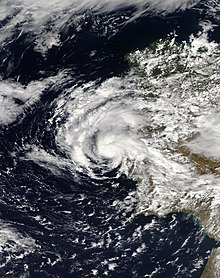 Alpha shortly before landfall in Portugal on 18 September | |
| Meteorological history | |
|---|---|
| Formed | 17 September 2020 |
| Dissipated | 19 September 2020 |
| Subtropical storm | |
| 1-minute sustained (SSHWS/NWS) | |
| Highest winds | 50 mph (85 km/h) |
| Lowest pressure | 996 mbar (hPa); 29.41 inHg (992 mbar (29.29 inHg) while extratropical) |
| Overall effects | |
| Fatalities | 1 indirect |
| Damage | >$24.2 million (2020 USD) |
| Areas affected | Portugal, Spain |
| IBTrACS | |
Part of the 2020 Atlantic hurricane season | |
Subtropical Storm Alpha was the first subtropical cyclone ever observed to make landfall in mainland Portugal. The twenty-second tropical or subtropical cyclone and twenty-first named storm of the extremely active and record-breaking 2020 Atlantic hurricane season, Alpha originated from a large non-tropical low that was first monitored by the National Hurricane Center on 15 September. Initially not anticipated to transition into a tropical cyclone, the low gradually tracked south-southeastward for several days with little development. By early on 17 September, the low had separated from its frontal features and exhibited sufficient organization to be classified as a subtropical cyclone, as it approached the Iberian Peninsula, becoming a subtropical storm around that time. Alpha then made landfall just south of Figueira da Foz, Portugal during the evening of 18 September, then rapidly weakened as it moved over the mountainous terrain of Northeastern Portugal. The system degenerated into a remnant low on 19 September, when it was last noted.
At least two EF1 tornadoes were confirmed in Portugal, and one person was killed due to strong winds in Spain. Impacts from Alpha were rather minor as a subtropical cyclone, although Alpha produced some significant rainfall and gusty winds in both Portugal and Spain as a remnant low.[1][2] Total damages from the storm were estimated to be greater than €20 million (US$24.2 million), with a majority of the damage occurring in Portugal.[3][4]
- ^ Cite error: The named reference
:2was invoked but never defined (see the help page). - ^ ""Unique" Iberian subtropical storm recorded". www.theportugalnews.com. The Portugal News. 25 September 2020. Retrieved 14 May 2021.
- ^ "Catástrofes naturais custaram a Portugal mais de 50 milhões de euros em 2020". www.tsf.pt (in Portuguese). TSF. 11 February 2021. Retrieved 14 May 2021.
- ^ "Global Catastrophe Recap September 2020" (PDF). Aon. 8 October 2020. Archived (PDF) from the original on 8 October 2020. Retrieved 8 October 2020.